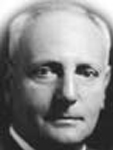
Father of Cincinnati’s Charter form of government, Harvard Law School-trained Murray Seasongood took on the nation’s worst governed city in 1923. His “Shot Heard ‘Round the Wards” – perhaps the single most important speech in local political history – ignited a reform movement that led Cincinnati to be hailed as the country’s best-run municipality. In the early Twentieth Century, Seasongood was a leader in the National Municipal League (now known as the National Civic League) that was founded in 1894 by Theodore Roosevelt, Louis Brandeis, Marshall Field and other turn of the century progressives.
In 1900, he graduated magna cum laude from Harvard University. After receiving his law degree, he worked at Legal Aid in New York City, returned to Cincinnati because of his father’s illness, and joined the law firm of a family friend. Seven decades later, he still was with the firm, but by then it bore his name – Paxton & Seasongood.
After control of a venal Republican machine passed from ‘Boss’ George Cox to his henchman, Rudolph Hynicka, in 1912, conditions in the city degenerated further into corruption. By the early 1920s, the city was nearly bankrupt, authorities threatened to close a hospital for tuberculosis patients and citizens often had to tip garbagemen to ensure service. Interest from public bank accounts lined the pockets of machine leaders, and streets were riddled with yawning potholes.
When Hynicka’s machine asked voters for a special tax levy in 1923, Seasongood went on the offensive with a speech to the Cincinnatus Association on Oct. 9. “We have the fourth-largest per capita expenditure of any city in the country. What do we get for it? Nothing, absolutely nothing. … I for one believe that the time has come to cut out every extra tax levy, bond issue or anything else that will give the bunch a chance to squander money. Make them produce the goods on what they have or get out,” he said.
Dubbed the “Shot Heard ‘Round the Wards”, the speech sparked intense public interest that forced Hynicka’s men to reluctantly accept Seasongood’s demand for a series of face-to-face debates. But after Seasongood easily got the better of Vice Mayor Froome Morris before the Walnut Hills Business Men’s Association, the machine called off future appearances. That simply allowed Seasongood to ‘debate’ an empty chair in Madisonville to dramatic effect. By campaign’s end, Seasongood almost singlehandedly defeated the levy, 60,434 votes to 46,496.
Setting his sights on the GOP machine itself, Seasongood in 1924 helped draft a proposed new charter calling for a nine-member council to replace the unwieldy 32-seat body then in place; a council-appointed city manager as chief administrator; a mayor selected by his council colleagues; and a proportional representation ballot. Despite two opposing measures placed on the ballot by Hynicka forces to confuse voters, the ‘Charterites’ carried the vote by a 2-to-1 margin, 92,510-41,015.
Then in November 1925, when the first council election under the new system was held, Seasongood and other Charterites were stunned when their ticket swept six seats to the Republicans’ three. Seasongood was named the first mayor under the new charter. His political career lasted only four years because he thought, like Cincinnatus, that citizens should help in political life, but not become politicians. He still was able to transform Cincinnati into one of the best-governed cities in the nation.
“The merit of a city is dependent upon the kind of government it has. We used to say that the city was being held back by rottenness at the City Hall; now we are sure of it,” Seasongood said at the end of his first term as mayor.
“In these two years we have seen the life of the city refreshed by the impulse flowing from the City Hall. A new courage has come to the people, and they go forward. The time may come when they will take a backward step … but they will never go back all the way, for the hearts of the people beat to the tune of new ideals.”
Seven months later, Seasongood died at 104 in his sleep at his home, where a framed copy of The Cincinnati Commercial Tribune of Nov. 5, 1924, reporting Charter’s historic 2-to-1 victory, hung on the bedroom wall.

